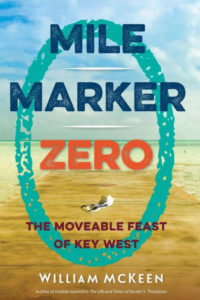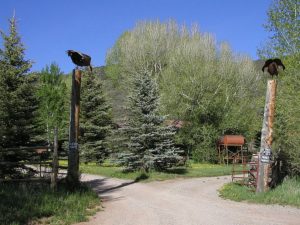Man on the Rum
Appeared in The Daily Beast, November 11, 2011

Like many young writers of his generation, Hunter S. Thompson had a man crush on Ernest Hemingway. He wanted to be like Papa when he grew up—novelist, sportsman, womanizer, and legend in his own time.
Young Thompson was so determined to be the Next Hemingway that he spent his cubicle hours as a Time magazine copy boy retyping The Sun Also Rises and A Farewell to Arms, not changing a word. He wanted to understand the rhythm of language, and feel those words traveling through his body. He taught himself to write by serving as phantom stenographer to the literary he-man.
He also sought Hemingway-esque adventure in the tropics, first in Puerto Rico in 1960, then in South America as a National Observer correspondent, and finally, at the end of the ’70s, in Key West. Those were Hemingway’s streets, and by the time Thompson arrived, the little island was thick with “New Hemingways,” including novelists Thomas McGuane and Jim Harrison.

By then, of course, Thompson was famous, but not as the novelist he’d wanted to be. Journalism was his quick buck to support his fiction habit. By the time he landed in Key West, he was fleeing suffocating celebrity, an ugly divorce, and a massive case of cocaine-induced writer’s block. In Key West, he wrote two screen treatments (unproduced) and attempted another novel. Being a novelist had always been his goal. Journalism paid the bills, but it made him too famous and he’d drifted from his original plan, to be a serious man of letters.
Prince Jellyfish, like most first novels, was drawn directly from his life. This story of a charming thug was well marinated in his early days in Louisville, Kentucky.
The Rum Diary came from those six months in Puerto Rico in 1960, and is the basis of an elegiac new film starring Johnny Depp.
What Thompson called his “proud highway” is littered with the roadkill of other novels—Guts Ball from the early ’70s, The Silk Road, from his Key West residency, and Polo Is My Life, which he called his “final statement.”
Of his novels, only The Rum Diary made it into print during his lifetime, in 1998, rather late in the game. He dragged the manuscript around for years, plagued with doubt, and once had it stolen back from his publisher so he could rewrite it again.
When I interviewed him for my first book about him, in 1991, I’d been hearing about this thing for years, so I asked, What’s the deal? It was “currently under cannibalization and transmogrification into a very strange movie,” he said then, and that was that.

Now, six years after he sucked the metallic popsicle at his Colorado ranch, that “very strange movie” has been filmed by his devoted friend. Fifteen years ago, Depp did the impossible, turning Thompson’s “unfilmable” Fear and Loathing in Las Vegas into a movie, giving a brilliant imitation of the Hunter Thompson character, a figure known as Raoul Duke. (Purists will insist that Bill Murray did a better job as Thompson in Where the Buffalo Roam.Unfortunately that dazzling performance is trapped in a low-rent movie.)
This time, Depp doesn’t reprise the Hunter / Raoul Duke crazy character. He accepts Paul Kemp, Rum Diary’s down-on-his-luck journalist, as a separate figure who shares Thompson’s DNA with Duke, but is not a clone. He also takes a lot of liberties with the story.
Thompson the novelist used his common-law wife and his Louisville friend Paul Semonin as characters. The three of them shared a cinder-block shack on the beach in Puerto Rico. Semonin had dated Sandra Conklin before Thompson, but when she came to visit they rarely wore clothes and were so relentlessly sexual that Semonin put in extra hours at the San Juan Star to avoid their display. Thompson made his hero, Paul Kemp, a reporter there, though the real-life story was not so glamorous. Thompson hung out at bowling alleys and worked as many names as he could into his column in Sportivo, a bowling magazine.
The novel was more brutal than Depp’s film, with a gang rape (of Chenault, Sandy Thompson’s fictional stand-in). The film’s trailers made Rum Diary into a rollicking comedy, in contrast to the downbeat novel. The trailer lied, of course.
The film is rich with beauty and filth, and the melancholy tone matches Thompson’s book. The Semonin character is gone and a romantic partner reassigned, but Depp’s mission here is to eulogize his friend. Rarely one to mire in sentiment, it’s fun to speculate how Thompson would have felt. For Thompson’s admirers—and they are legion—the ending is a guaranteed lump-in-the-throat moment.
Thompson liked my first book on him. I know, because he offered to gouge out my eyes. “How fast can you learn Braille?” he asked. I don’t know how he would feel about my post-mortem book, Outlaw Journalist, or my new book, Mile Marker Zero, which deals with his Hemingway fixation. Looking back over the arc of his life, I saw a man trying to see what he could “get away with.” He had enormous talent and got away with using just a fraction of it. What haunted him at the end, I decided, was his realization of how good he could have been if he had worked harder. He suffered Terry Malloy couldda-been-a-contenduh syndrome.
In the ’70s, Thomas McGuane was the writer most often called “The New Hemingway.” He got over it and became Tom McGuane. Not long after Thompson’s suicide, McGuane reflected on his friend’s death. “It was the Hemingway story,” McGuane said. “He was a wonderful writer and he loved being a celebrity but that comes and goes. Literature is always there and writing is always there. They don’t come and go. If you get addicted to being popular, you’re hosed.”
The epic sadness at the end of the film comes when the Thompson character sails off to America, to become a pain in the national ass. We know what a magnificent fuss he will make, and we also know how that story will end, and that the young man’s heroic promise would ultimately go unfulfilled.
